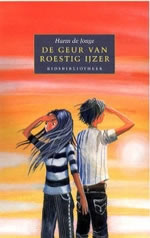Harm de Jonge
The Scent of Rusty Iron (De geur van roestig ijzer)
Joeri has still got a bottle of aftershave that belonged to his dad, who doesn’t live at home any more. When he smells it, it’s just as though his dad’s there. And then Joeri can even talk to his dad, about the Turkish girl Nesrin, for example, who smells like rusty iron, the best smell that Joeri knows.
Nesrin races around in scrap cars and dreams of the poppy fields in the Zviccyn Valley, where she was born and where her mother is buried. Her father always promises that they’ll go there on holiday but, much to the anger of Nesrin, it doesn’t come to anything.
And then there’s the ancient Bruno Levie, who wants to go to the Valley of Butterflies in Israel. Three people, each with their own dreams: they find each other on a strange journey in an old car.
The use of language in this work by De Jonge is so evocative that you can feel and smell the colourful contrasts of the characters.
This is a brilliant book about friendship and loneliness, about loss and about going in search of what has been lost.
Publisher
Lemniscaat
Vijverlaan 48
NL - 3062 HL Rotterdam
TEL. +31 10 206 29 29
FAX +31 10 414 15 60
Website: www.lemniscaat.nl
Publishing details
De geur van roestig ijzer (2005, 96 pp)

Biography
Harm de Jonge (b. 1939) grew up onboard a ship. Since his parents were away at sea, he spent his school years with various host families. He studied Dutch and became a teacher, first at a high school and then at a training college for elementary school teachers. His debut, Steenkuib is een rat (‘Steenkuib is a Rat’, 1989), did not appear until he was fifty. Since then he has written over twenty books, including Het peergeheim, Jesse Ballewal-tsji (which won the Vlag en Wimpel), De gouden golf and De circusfietser. De peperdans van Panzibas was on the shortlist for the Gouden Uil in 2005. Josja Pruis was awarded the Woutertje Pieterse Prize in 2007. De Jonge’s characters are usually to be found having adventures out on the streets or in the countryside and his stories always feature a mysterious friend with an awkward secret. In Tjibbe Tjabbes’ wereldreis (Tjibbe Tjabbes’ Voyage around the World), he deviates from this pattern for the first time.
